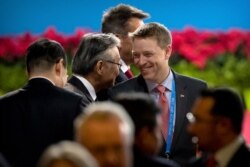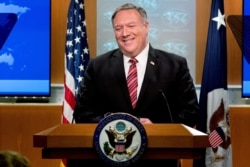A top U.S. official behind the Trump administration’s China policies is reaching out directly to the Chinese people in pressing U.S. concerns over China’s handling of the COVID-19 pandemic.
U.S. Deputy National Security Adviser Matt Pottinger, speaking in Mandarin Chinese on Monday, said China’s communist ruling party is risking a popular backlash if Beijing does not ease controls on free speech.
“When small acts of bravery are stamped out by governments, big acts of bravery follow,” Pottinger said during a webinar hosted by University of Virginia’s Miller Center.
The warning came on a day when China marked the 101st anniversary of the May Fourth Movement, a cultural and political protest movement that propelled China toward modernity.
Since the coronavirus outbreak in China, authorities have clamped down on critics who pointed out shortcomings in the government’s response. Chinese doctors, including the coronavirus whistleblower Dr. Li Wenliang who sounded early alarms before succumbing to the virus, were punished. Others, including citizen journalists such as Chen Qiushi, Fang Bin and Li Zehua who spoke out against authorities’ mishandling of the crisis, went missing.
“When a privileged few grow too remote and self-interested, populism is what pulls them back or pitches them overboard. It has a kinetic energy. It fueled the Brexit vote of 2015 and President Trump’s election in 2016,” Pottinger added.
Pottinger, a former Marine officer and reporter with the Wall Street Journal who reported from China for several years, is among the top U.S. officials who have been publicly drawing distinctions between China’s ruling communist party and the Chinese people.
Secretary of State Mike Pompeo, a regular critic of the Beijing government, has complimented the Chinese people as “smart” and “hard-working,” while disparaging Beijing’s treatment of its citizens.
The message from the White House came soon after a news report from Beijing said an internal communist party document is warning of rising global hostility over the coronavirus outbreak.
Reuters, which reported the warning recently presented to top Chinese leaders, concluded that global anti-China sentiment is at its highest since the 1989 Tiananmen Square crackdown and could tip Beijing’s relations with Washington into confrontation.
Relations between the U.S. and China have significantly deteriorated since the coronavirus outbreak that has killed about 250,000 people worldwide.
In recent weeks, the two countries have sharpened their accusations over the handling of the pandemic. The U.S. said China hid the severity of the outbreak and did not allow in American investigators to study the virus early on. China insists it has been transparent and worked with the World Health Organization to prepare countries for the coming health disaster.
Mistrust between the world’s two leading economies also grows from what Washington said Beijing’s unfair trade and technology practices to disputes over Hong Kong, Taiwan and contested territories in the South China Sea.






